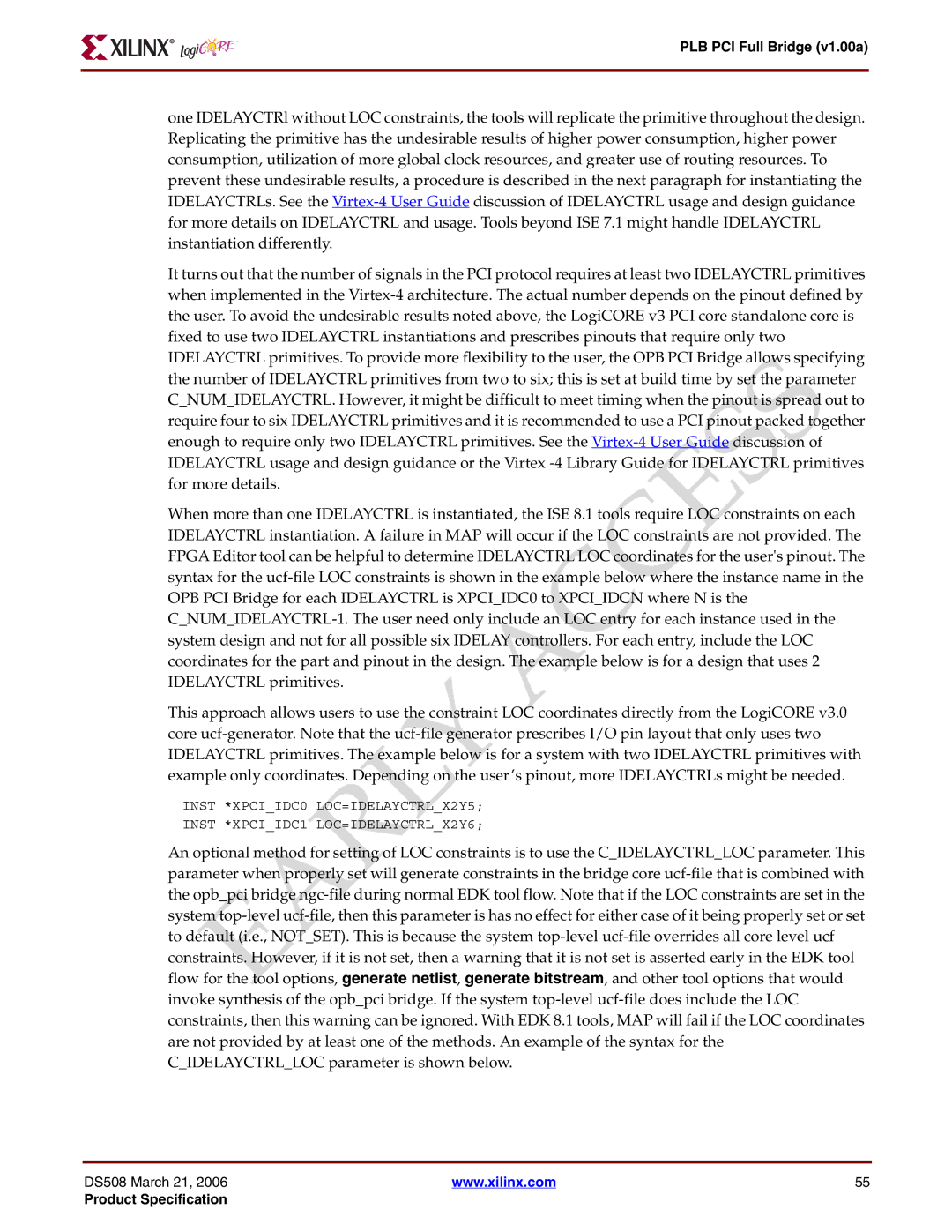PLB PCI Full Bridge (v1.00a)
one IDELAYCTRl without LOC constraints, the tools will replicate the primitive throughout the design. Replicating the primitive has the undesirable results of higher power consumption, higher power consumption, utilization of more global clock resources, and greater use of routing resources. To prevent these undesirable results, a procedure is described in the next paragraph for instantiating the IDELAYCTRLs. See the Virtex-4 User Guide discussion of IDELAYCTRL usage and design guidance for more details on IDELAYCTRL and usage. Tools beyond ISE 7.1 might handle IDELAYCTRL instantiation differently.
It turns out that the number of signals in the PCI protocol requires at least two IDELAYCTRL primitives when implemented in the Virtex-4 architecture. The actual number depends on the pinout defined by the user. To avoid the undesirable results noted above, the LogiCORE v3 PCI core standalone core is fixed to use two IDELAYCTRL instantiations and prescribes pinouts that require only two IDELAYCTRL primitives. To provide more flexibility to the user, the OPB PCI Bridge allows specifying the number of IDELAYCTRL primitives from two to six; this is set at build time by set the parameter C_NUM_IDELAYCTRL. However, it might be difficult to meet timing when the pinout is spread out to require four to six IDELAYCTRL primitives and it is recommended to use a PCI pinout packed together enough to require only two IDELAYCTRL primitives. See the Virtex-4 User Guide discussion of IDELAYCTRL usage and design guidance or the Virtex -4 Library Guide for IDELAYCTRL primitives for more details.
When more than one IDELAYCTRL is instantiated, the ISE 8.1 tools require LOC constraints on each IDELAYCTRL instantiation. A failure in MAP will occur if the LOC constraints are not provided. The FPGA Editor tool can be helpful to determine IDELAYCTRL LOC coordinates for the user's pinout. The syntax for the ucf-file LOC constraints is shown in the example below where the instance name in the OPB PCI Bridge for each IDELAYCTRL is XPCI_IDC0 to XPCI IDCN where N is the C_NUM_IDELAYCTRL-1. The user need only include an LOC entry for each instance used in the system design and not for all possible six IDELAY controllers. For each entry, include the LOC coordinates for the part and pinout in the design. The example below is for a design that uses 2 IDELAYCTRL primitives.
This approach allows users to use the constraint LOC coordinates directly from the LogiCORE v3.0 core ucf-generator. Note that the ucf-file generator prescribes I/O pin layout that only uses two IDELAYCTRL primitives. The example below is for a system with two IDELAYCTRL primitives with example only coordinates. Depending on the user’s pinout, more IDELAYCTRLs might be needed.
INST *XPCI_IDC0 LOC=IDELAYCTRL X2Y5;
INST *XPCI_IDC1 LOC=IDELAYCTRL_X2Y6;
An optional method for setting of LOC constraints is to use the C_IDELAYCTRL_LOC parameter. This parameter when properly set will generate constraints in the bridge core ucf-file that is combined with the opb_pci bridge ngc-file during normal EDK tool flow. Note that if the LOC constraints are set in the system top-level ucf-file, then this parameter is has no effect for either case of it being properly set or set to default (i.e., NOT SET). This is because the system top-level ucf-file overrides all core level ucf constraints. However, if it is not set, then a warning that it is not set is asserted early in the EDK tool flow for the tool options, generate netlist, generate bitstream, and other tool options that would invoke synthesis of the opb_pci bridge. If the system top-level ucf-file does include the LOC constraints, then this warning can be ignored. With EDK 8.1 tools, MAP will fail if the LOC coordinates are not provided by at least one of the methods. An example of the syntax for the C_IDELAYCTRL_LOC parameter is shown below.
DS508 March 21, 2006 | www.xilinx.com | 55 |
Product Specification

